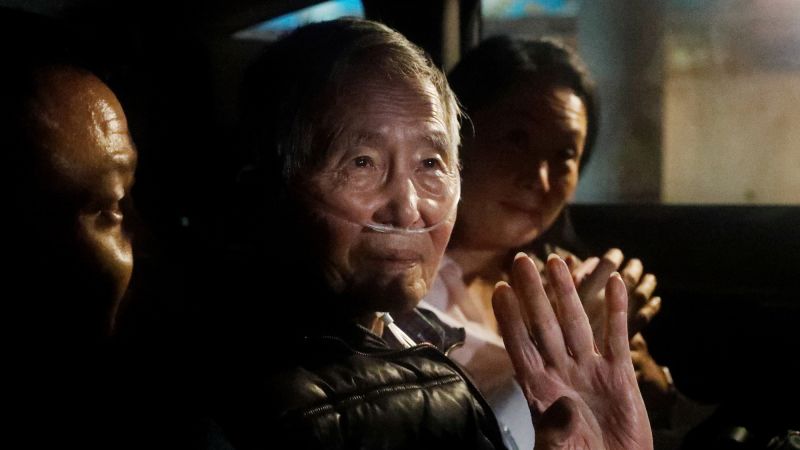CNN
—
Former Peruvian President Alberto Fujimori, whose complicated and painful legacy included stabilizing the country’s economy before being imprisoned for human rights abuses and corruption scandals, has died at the age of 86.
“After a long battle with cancer, our father Alberto Fujimori has just left for the Lord’s world. We ask all those who loved him to accompany us with a prayer for the eternal rest of his soul,” said his daughter Keiko Fujimori on Wednesday evening on X.
Fujimori, who ruled Peru from 1990 to 2000 during one of the country’s most divided times, has been battling for his health, his family doctor Alejandro Aguinaga said in a brief statement to reporters outside Keiko Fujimori’s home on Wednesday.
Fujimori had previously announced that he had been diagnosed with a new malignant tumor in May.
Fujimori was a figure who caused deep divisions in his country. During his time in office, he was able to save the country from economic collapse and defeat a terrorist group that had destabilized the country.
But he was also an authoritarian leader who used security forces to suppress opposition parties and was later convicted of serious human rights abuses and corruption.
Fujimori, the son of Japanese immigrants, studied at an agricultural university in the Peruvian capital Lima before going to the United States and France for his postgraduate studies.
Back in Peru, he hosted a television program on environmental issues before running for president in 1989 as leader of a new party – Cambio 90 (“Change 90”) – and ultimately defeated the future Nobel Prize winner for literature Mario Vargas Llosa.
As he rose to power, he joined a small number of politicians of Asian descent leading non-Asian countries.
Fujimori took over a country in economic crisis. Soon after taking office, he implemented a strict economic policy known as the “Fujishock” that curbed hyperinflation.
He also claimed to have defeated the Shining Path rebel movement, one of Latin America’s oldest guerrilla groups, after his government captured the group’s leader, Abimael Guzman, who was responsible for tens of thousands of deaths. Years later, he won international acclaim for his handling of a months-long hostage-taking of the Japanese ambassador’s residence by another rebel group.

For some Peruvians, Fujimori’s domestic victories transformed him from a political outsider into the strongman the country needed. But the former president had an authoritarian streak and used security forces to suppress his opponents. Allegations of abuse of power and corruption soon surfaced, casting a dark shadow over his national achievements.
In the early 1990s, Fujimori’s then-wife Susana Higuchi publicly denounced him as corrupt, claiming that his family had illegally sold donated clothing to Japan. After the couple divorced, Fujimori appointed the couple’s eldest daughter, Keiko, as Peru’s First Lady before his second term.
In 2000, Fujimori ran for an unprecedented third term despite doubts about the constitutionality of his re-election. He won, prompting his main opposition candidate to claim electoral fraud.
But his government collapsed spectacularly later that year after videos of Vladimiro Montesinos, his powerful intelligence chief for over a decade, were leaked showing Montesinos bribing an opposition congressman. The scandal quickly escalated as numerous incriminating videos emerged.
Fujimori denied any wrongdoing, but his public image began to change. Many Peruvians were skeptical and insisted that he must have known about his key adviser’s abuse of power and embezzlement.
In November of that year, during a trip to Japan, Fujimori attempted to resign from the Peruvian presidency by faxing his resignation home. The move plunged the country’s political landscape into chaos. Days later, the Peruvian parliament instead dismissed him, saying he was “morally unfit” to govern.
He stayed in Japan for several years, hoping to one day return to the upper echelons of Peruvian politics. In the mid-2000s, he traveled to Chile to prepare a political comeback, but was promptly arrested and eventually extradited to Peru, where he faced charges including human rights violations.
Due to his deteriorating health, Fujimori spent several years in prison in recent years after being convicted in four different criminal trials.
In 2009, a special Supreme Court court sentenced him to 25 years in prison for authorizing the use of a death squad responsible for killing civilians.
In separate trials, the former president was also found guilty of breaking into Montesinos’ house to steal incriminating videos, taking money from the state treasury to pay the intelligence chief, authorizing illegal wiretapping and bribing lawmakers and journalists.

In December 2017, he received a medical pardon for his human rights violations from then-Peruvian President Pedro Pablo Kuczynski. Kuczynski’s office issued a statement at the time saying that Fujimori “suffers from a progressive, degenerative and incurable disease,” adding: “The conditions of his detention pose a serious threat to his life, health and integrity.”
“I am aware that what came out during my time in office was well received on the one hand, but I acknowledge that I have also disappointed other compatriots on the other. I ask them for forgiveness from the bottom of my heart,” Fujimori said in a video filmed from his hospital bed. posted on Twitter in 2017.
However, the pardon sparked violent protests in the capital Lima and provoked widespread criticism from human rights organizations and politicians.
The verdict was eventually overturned and he was sent back to prison in January 2019. Separately, a Peruvian court ruled in 2018 that he could stand trial for ordering the kidnapping, torture and murder of six people in the central Peruvian city of Pativilca in 1992, according to the state-run Andina news agency.
Even after numerous convictions, Fujimori always stood firm and argued that everything he did was for the good of the country. He maintained this stance until the end.

